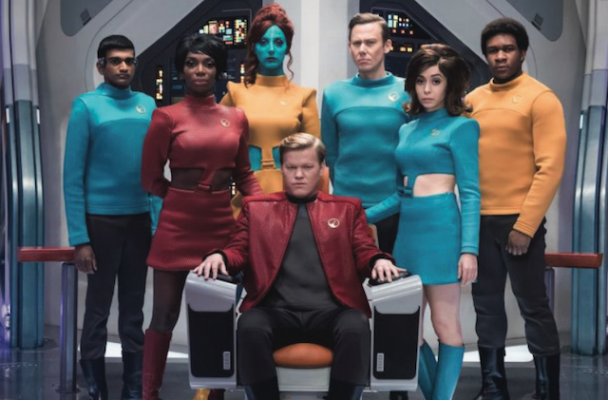Season four of ‘Black Mirror’ proves more optimistic than before

By Andrew Henderson: A&E Editor
Every time a new season of “Black Mirror” premieres, it gives us a new perspective of how technology could develop and its worst case scenarios. But this year, “Black Mirror” takes a new approach: optimism. There is still cynicism in some of the episodes, but this is definitely one of the lighter seasons. That is a lot to say coming from a series that has shown us everything from an animated bear becoming a world leader, to the Prime Minister of the UK preforming degrading acts on a pig for an entire country to see. But like always, each episode of “Black Mirror” proves to be something different. While each episode in this season is great, some just blow it out of the park, while others falter slightly with their ideas.
Black Museum. This episode is structurally similar to the episode “White Christmas,” as the main story is intersected with three short stories. A lonely traveler stops at a roadside museum and hears stories of the various technological marvels and horrors that await in it from creator himself, Rolo Haynes. Even though each story told in this episode is disconnected, certain aspects are the key to advancing it, and ultimately foreshadowing the end to this tale as well. This episode also features a huge amount of callbacks to past episodes, making the entire series finally connected in very subtle ways. If “Black Mirror” were to do more episodes like this, I would love for Rolo Haynes to come back, as his character is the true embodiment of the series: technology progressing forward, no matter the cost.
USS Callister. What at first seems like a low-budget “Star Trek” parody reveals its cards fairly early in the episode. In this story, the creator of the extremely popular MMO Infinity clones his employees that treat him unfairly, and constantly puts them through mental and physical abuse aboard his own pocket universe within the game. This episode is the funniest “Black Mirror” episode by far. The crew’s interactions with each other and the overall campiness of “Space Fleet” missions leads to some great laughs, especially from Cristin Milioti and Jimmi Simpson. But where credit is due is with Jesse Plemons’s character, Robert Daly. Daly is a strange character. In the beginning you feel bad for him, as his employees treat him like he is not even there, to the point where the scanners to get in his work do not even recognize him. But as the episode goes on, you see this character’s true colors, as he plays into the part of an unchecked God in his little universe.
Hang the DJ. This is the episode that really gives this season its optimism. “Hang the DJ” plays like a romantic comedy, and something really different than Charlie Booker and company has produced for this series so far. The main premise of this episode is that in the future, people are matched by a system far more complex than Tinder that pairs people up for a certain amount of days until they find their true love. It could also be looked at as a coming of age story, as it follows two people in this post-Tinder world trying to find themselves and who they want to be with, or who they are suppose to be with, for the rest of their lives. Overall, it was a heartfelt story, and it proved that “Black Mirror” does not always have to rely on the cynical side of technology.
Metalhead. This episode was one of the shortest in the series, but also one of the most creative. Shot entirely in black and white with barely any speaking, “Metalhead” is a story about optimism in a world that has all but broken down. The story begins with our protagonist searching for an object that she promised for her sister. However, lethal robotic dogs then hunt her down. What follows in the next 40 minutes is a tense cat and dog survival story, which is reminiscent of movies such as “The Terminator” and “The Predator.” The details on the world and technology may be sparse, but it is enough to be enticing and make the viewer asks questions of what ultimately happened.
Crocodile. This is the most classic “Black Mirror” episode of the season. This season may have a more positive theme than most, but Crocodile was one of the darkest “Black Mirror” episodes I have ever seen. When the past comes back to Mia, a blood trail starts in her path, as she tries to eliminate everything that could tie her to an awful event in her past. This story is just truly bloody and dark, as Mia just shows no mercy for anything that crosses her path throughout this episode, and it does not end well for anyone. Past episodes may have had a depressing ending, but they had themes and offered questions to the viewer. “Crocodile” is just a dreary violent affair.
ArkAngel. Talk about a misfire. “ArkAngel” is one of the least interesting and dull episodes “Black Mirror” has ever told. After her daughter gets lost at the park, a concerned mother fits her with the ArkAngel chip, a service that is able to monitor and protect a user. While successful in her infant years, the daughter and mother become more strained as she grows up, and paranoia sets in as the mother begins to reuse the system. While the system could have been more interesting to dwell into, this episode puts obsessive parenting in the forefront. The mother helicopters over her daughter to extremes, and ultimately leads to their violent fracture. “ArkAngel” could have been an interesting episode, but turned out to be one of the very few dull and below average episodes of “Black Mirror.”